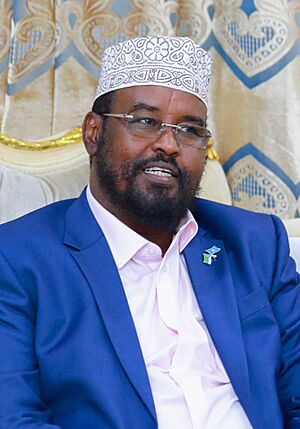Ahmed Mohamed Islam facts for kids
Quick facts for kids
Sheikh Ahmed Mohamed Islaam
|
|
|---|---|
 |
|
| 1st President of Jubaland | |
| Assumed office 1 October 2012 |
|
| Vice President | Abdulahi Sheik Ismael Fara-Tag (2013-2016) Mohamud Sayid Aden (2016-) |
| Preceded by | Mohamed Abdi Mohamed as the President of Azania |
| 1st Chairman of the Raskamboni Movement | |
| Assumed office 7 October 2009 |
|
| Deputy | Ma'alin Mohamed Ibrahim Mohamud (2009 - 2020) Abdinasir Seerar Maah (Since 2020) |
| Preceded by | Office Established |
| Personal details | |
| Born | 1951 (age 74–75) Kebri Dahar, Ethiopia |
| Military service | |
| Battles/wars |
|
Sheikh Ahmed Mohamed Islaam, also known as Ahmed Madobe, is a Somali politician. He is the current president of the Jubaland state in Somalia. He also leads the Raskamboni Movement.
Contents
Ahmed Madobe's Early Life
Ahmed Madobe was born in Kebri Dahar, a town in the Somali Region of Ethiopia. When he was young, he moved to Mogadishu, the capital city of Somalia. There, he finished high school. He then went on to study Islamic law at university.
Madobe's Early Political Involvement
Before 1991, when the Somali government collapsed, Madobe was part of a group called Al-Itihaad al-Islamiya. He was involved in efforts to take control of Kismayo in the early 1990s. He also took part in actions against Ethiopia.
Role in the Islamic Courts Union
In 2006, Madobe joined the Islamic Courts Union (ICU). This group was trying to gain control of Mogadishu. After the ICU took over Kismayo in August 2006, Madobe became the governor. He governed the areas of Lower Juba, Middle Juba, and Gedo. These areas now make up Jubaland.
The ICU later moved deeper into southern Somalia. This happened after Ethiopia entered the conflict in December 2006. Madobe was injured during clashes near Kismayo. He was later captured near the Kenyan border. After receiving medical care, he was held until Ethiopia left Somalia in January 2009.
After his release, Madobe joined the new government led by Sharif Sheikh Ahmed. However, he resigned from parliament in April 2009. He stated he had joined only to be released from prison.
Joining Hizbul Islam
Madobe later became part of Hizbul Islam. He served as a local commander in Kismayo. In 2009, Hizbul Islam and Al-Shabaab shared control of Kismayo. However, conflicts later arose between these groups. Madobe was involved in these clashes.
Becoming Jubaland President
Ahmed Madobe was the leader of the Raskamboni Movement. His forces, with help from the Kenya Defence Forces, captured the important port city of Kismayo from Al-Shabaab. This happened on October 1, 2012.
After this, Madobe was chosen as the temporary head of the Jubaland Administration. Eight months later, on May 15, 2013, he was elected as the interim president of Jubaland. This was for a two-year transition period.
Agreement with the Somali Federal Government
On August 28, 2013, Madobe signed an important agreement. This was a national reconciliation agreement with the Somali federal government. It was signed in Addis Ababa, Ethiopia. The agreement was supported by the federal government.
Under this agreement, Jubaland would be managed by a Juba Interim Administration for two years. Madobe would lead this administration. He would also be the chairperson of a new Executive Council. He would appoint three deputies to help him.
The agreement also stated that Kismayo's seaport and airport would be managed by the Federal Government after six months. Money earned from these places would be used for services and security in Jubaland. It would also help develop local institutions.
Additionally, Jubaland's military forces would join the central command of the Somali National Army (SNA). The Juba Interim Administration would be in charge of the regional police. Many international groups praised this agreement as a step towards a better future for Somalia.
Re-election in 2015
On August 15, 2015, Madobe was re-elected as President of Jubaland State. The Jubaland parliament voted, and he received 68 votes.
He was sworn into office for another four-year term in August 2019. He won a large majority of the votes from the region's lawmakers in Kismayu.
The United Nations had asked for a fair and peaceful election. However, the Somali Federal Government did not support this election. They backed a different candidate.
There were some disagreements between the Federal Government and Jubaland State. In June 2020, the Federal Government recognized Madobe as the interim president of Jubaland State. However, they said his term was for two years, not the four years stated in the Jubaland State constitution.
 | Aurelia Browder |
 | Nannie Helen Burroughs |
 | Michelle Alexander |


